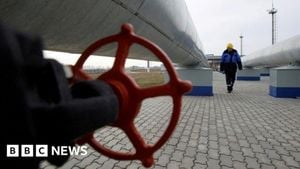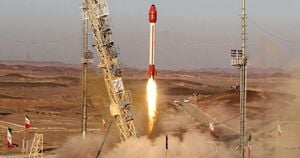CAIRO - An emergency Arab Summit is scheduled to take place on March 4, 2025, at the behest of Egyptian President Abdel Fattah El-Sisi, who has extended the invitation to the newly appointed Syrian President Ahmad al-Shara. This meeting is pivotal as it aims to address the geopolitical challenges facing the Arab world, particularly the contentious situation surrounding Gaza and the broader strategic concerns influencing the region.
The call for this summit stems from pressing regional issues exacerbated by U.S. foreign policy initiatives, especially those introduced by President Donald Trump. Key discussions will revolve around the controversial plan proposed by the Trump administration which suggests relocating Gaza's residents to Egypt and Jordan, transforming the area often referred to as the "Riviera of the Middle East." This move has raised significant alarm among Arab leaders who fear it may undermine their political standings and regional stability.
According to reports from Reuters, "The emergency summit is necessary for uniting Arab voices against external pressures," highlighting the urgency for collaborative strategies to tackle these dilemmas facing the Arab nations. The summit signifies not just the attempt to deliberate on Gaza but also to reconfigure the relationships among Arab states, particularly after Syria’s tumultuous political transition.
Since the ousting of President Bashar al-Assad, Ahmad al-Shara's administration has been striving to regain Syria's standing within the Arab League. He emphasized the need for extensive political processes, including creating inclusive governance and facilitating eventual elections, which may take up to four years. The Syrian presidency has noted, "Syria is aiming to rebuild its relationships with the Arab nations following political changes," indicating their commitment to smoother relations with fellow Arab states.
The careful strategy employed by Egypt reflects a nuanced approach to Syria’s reintegration. The nation has opted for caution, indicating the importance of addressing any potential political interference from external players. Hence, the meeting will serve as not only negotiation but also as reconciliation within the region.
Eastern analysts warn, "Failure to cooperate may lead to dire consequences for the region," signaling the importance of the summit's outcomes not just for Gaza's future but for the overall stability of the Middle East. Conclusively, the decisions made at this summit are anticipated to resonate far beyond its immediate discussions, potentially reshaping alliances and political liabilities for each nation involved.
This emergency Arab Summit embodies the collective resolve of Arab nations to face formidable outside influences and assert their position amid growing international tensions. The potential remapping of Gaza's demographics and the anticipated dialogue surrounding Syria’s return to the fold signify significant shifts and reaffirm the Arab League's continuing relevance.
Discussions at the summit will also echo the existing sentiments across the Arab world which have historically opposed forced relocations and demographic engineering proposed by foreign powers. Leaders are expected not only to advocate for Palestine but also reaffirm the need for unity among Arab states against external pressures.



